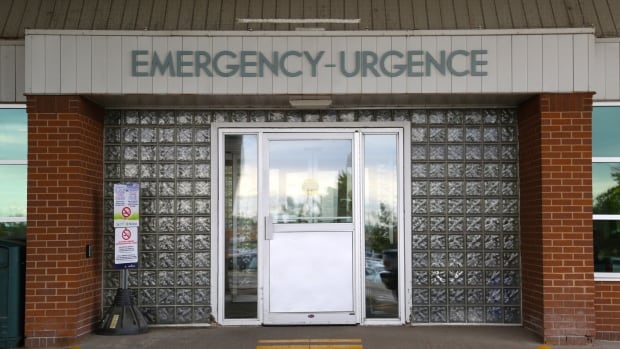
As Tim Brooks left a hospital washroom where garbage and urine had spread on the floor, he saw a partially dressed patient on a stretcher in the emergency department.
Brooks covered the patient with a blanket and went back to the chair where he’d been sitting for hours, waiting for a hospital bed.
“I saw the looks on the nurses’ faces,” he said of his holiday experience at the Fredericton emergency department. “I could hear them speaking, hear the worry in their voices.
“There were patients in the hallways of the emergency room, [having] all kinds of varying degrees of need of help.”
Brooks, who had pneumonia, arrived at the Dr. Everett Chalmers Hospital in Fredericton at 11 a.m. on Dec. 27. People were lined up along the hallway to the entrance of the emergency room, but since Brooks was on the verge of losing consciousness, he said, he was seen right away.

Others weren’t so lucky.
A sign on the door warned people they’d be waiting 18 to 20 hours to receive care. Brooks said he watched people throw up in the hallways.
Staffing shortages, a high number of patients and a lack of beds caused several hospitals in New Brunswick to issue advisories and even close some departments in the last week of December.
Many hospitals continue to face closures and challenges, including the Enfant-Jésus RHSJ Hospital in Caraquet, which Vitalité Health Network told CBC News has an occupancy rate of 182 per cent.
A Horizon Health spokesperson would not be interviewed, but the network said in a statement to CBC News that its emergency departments remain “extremely busy” this week.
Tim Brooks spent almost five days in the emergency department of the Dr. Everett Chalmers Hospital. While he was there, he saw people wait for hours to receive care, washrooms get filthy and patients forced to sleep in hallways.
“Patients with anything less than a life-threatening or emergency medical need will likely experience longer than normal wait times for care in our EDs as we continue to navigate these challenges.”
Brooks, who lives in Riverview but was in Fredericton to see family, said he tried to access the online dashboard that displays emergency room wait times before going to the hospital, but the website was down for maintenance. He decided to go anyway.
“It was like nothing I’d ever seen before,” said the teacher, who didn’t leave the Chalmers until New Year’s Eve.
After waiting in an isolated area for at least 10 hours, near the nurses’ station, Brooks was taken somewhere to sleep. After the second night, he was finally brought upstairs to a different room — except it wasn’t a room.
Previously a television room where families could sit and wait, the space was now divided in two by a curtain. Brooks shared the space with an elderly patient awaiting long-term care. The closest washroom was 30 metres down the hallway, and Brooks said patients with dementia were freely wandering around.
“I want to reiterate that staff was doing as much as they possibly could,” he said.
“They had more patients than they should have had.”

On his last day at the hospital, Brooks asked his doctor what was going on.
He was told the doctor was “only supposed to have, on any given day, 15 patients. They were 11 or 12 over that number. … They said, ‘I may not get to them all. It will not be as thorough as I would like it to be.'”
Brooks said one of his roommates sat in a urine-soaked garment for hours.
It made him imagine his own parents in that situation.
“You know, people that I love,” he said. “What a slap in the face it would be to be near the end of one’s life and have to sit in one’s urine for a whole day when trying to access care.
“I did not want [my mother] anywhere near that place.”
A daughter becomes a nurse
That was the reality for Lisa Jensen-Jones.
Her 85-year-old mother, sick with influenza, called an ambulance on Dec. 26. Her blood pressure was 210 over 100, but Jensen-Jones said paramedics told her they’d have to bring her to the waiting room at the Chalmers.
“They told me the reason that they would have to do that is because they had just been up to emerge and had taken somebody by ambulance, and there was no room in the back hall,” Jensen-Jones said.
When Jensen-Jones arrived at the hospital, she described a scene similar to what Brooks found — people lined up and down the hallway to the sliding doors at the entrance. Inside, she said conditions were “appalling,” with garbage overflowing onto filthy floors.
“It’s deplorable,” she said. “I cried more than once to see how horrible it was.”
After the paramedics brought her mother to the hospital, she was eventually placed in a room Jensen-Jones described as a storage closet. There was no bed and there was no heat. Her mother slept there in the ambulance gurney for the next six days.
There was also no washroom, and staff eventually brought in a commode that Jensen-Jones said was not regularly cleaned. Separated by a curtain, her mother shared the small space with an elderly man. Jensen-Jones said he too had influenza and was too weak to feed himself.
“His wife lives out of town a bit and she’s old. She came in and fed him, but she would find trays of food sitting there that he hadn’t eaten, because he couldn’t feed himself.”
Jensen-Jones works full time, but she found herself taking on the role of a nurse for her mother. She brought her clean clothes, warm socks and extra blankets, worrying that the poor conditions would make her mother even sicker.
“And I tucked her all in,” she said, starting to cry. “I’m quite emotional, I’m sorry.”
At one point, she said, her mother called her. The nurse who’d been taking care of her had left, and no one replaced her.
It was devastating, Jensen-Jones said, to see a parent in that vulnerable state.
“You don’t feel that they’re safe,” she said. “It was very painful to see my mom like that and to leave her and walk away.”
On New Year’s Eve, Jensen-Jones’s mother finally got a room at the hospital. With its big windows and regular bed, Jensen-Jones said she felt like she was walking into a palace.
“But all I could think about was all the people who were downstairs still.”
